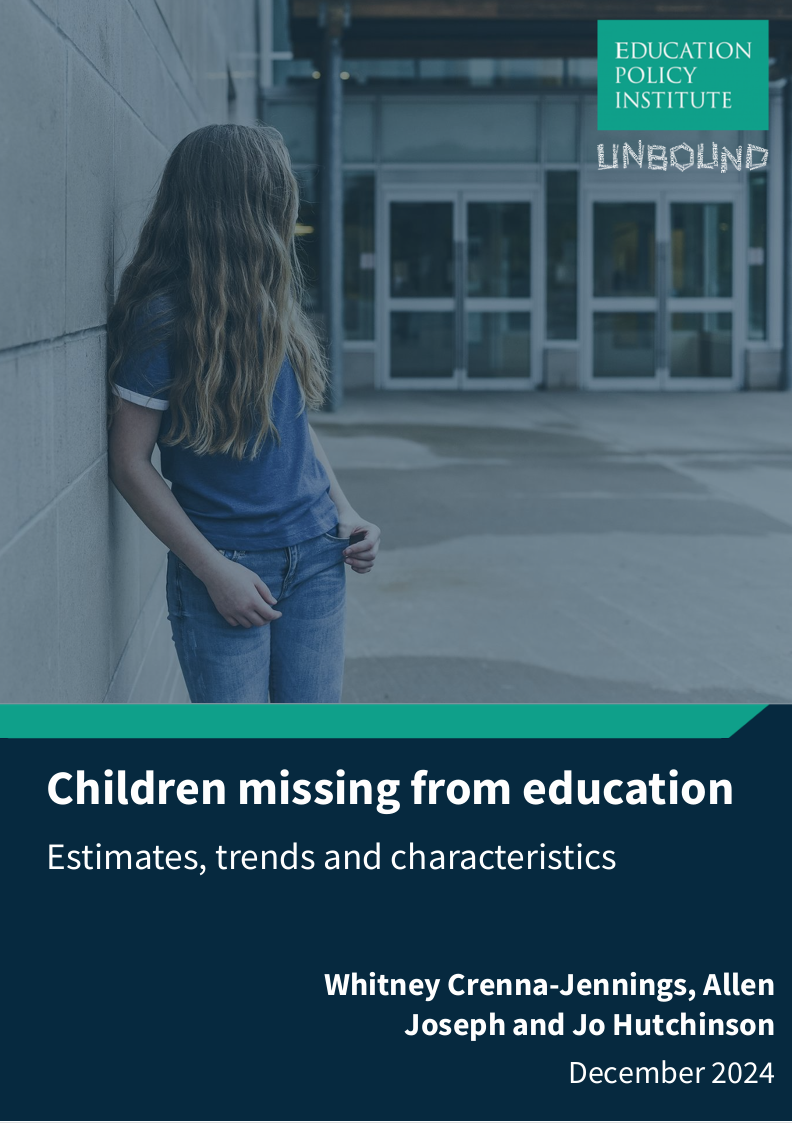⏱️ Estimated Read: 4 min
A new report by the Education Policy Institute finds that up to 300,000 children may be missing from education entirely.
- By comparing GP registrations with school registrations and data on pupils in registered home education for the first time, EPI finds that up to 300,000 children may be missing entirely from education in 2023, a 40 per cent increase from 2017.[1]
- Up to 400,000 children are estimated to be not in school, a 50 per cent increase. According to available data the number of formally registered home-educated children has increased by over 100 per cent from 2017 to almost 95,000 children in 2023.
- Additionally, using Department for Education data, findings show that over 50,000 pupils ever registered in a state school, or around 8 per cent of the cohort, leave the system and are not in a mainstream school, alternative provision or an independent school by year 11. Schools are not required to record the reasons for pupils leaving their rolls, and we do not know how many of these exits are due to migration out of the country.
- Certain groups are at a higher risk of exiting the English education system permanently:
•75 per cent of Traveller pupils and 50 per cent of Gypsy/Roma pupils.
•Almost a fifth of persistently disadvantaged pupils (those who are eligible for free school meals for at least 80 per cent of relevant terms) and
permanently excluded pupils.
•Approximately 1 in 8 care-experienced pupils.
- The number of system exits rises significantly through secondary school and peaks in year 10 before pupils sit their GCSEs. Around a fifth of all exits through the primary and secondary phases occur in year 10.
- Finally, the report looks at pupils who leave a mainstream state school for at least one term but are re-registered by year 11. Pupils with social, emotional, or mental health difficulties and care-experienced children were more than twice as likely to miss a period of mainstream education during the primary or secondary phases, compared with the overall cohort.
The report recommends that:
- The government should build on their existing plans to create a register of ‘children not in school’. By integrating data from education, health and other relevant administrative data sources, the ONS could maintain a more complete register on all children in contact with services in England.
- Schools should be required to record reasons for removing pupils from their rolls. This would allow better oversight of illegal exclusions, including off-rolling; the role played by mental health issues or disengagement from education in system exits; along with a better understanding of the proportion of system exits related to out-migration from the country.
- Further research into best practices for preventing, engaging with, providing for, and supporting children missing or who go missing from education is necessary. Current evidence is weak, and more investigation into and piloting of interventions to prevent vulnerable young people from becoming disengaged, as well as best practice for engaging children and families who have not interacted with the education system, is needed.
- The ONS must continue its work to improve the timeliness, accuracy and reliability of population estimates. No data source can currently provide a definitive answer on the number of children in England, let alone the number of children missing from education. Given the role population estimates play in policymaking and resource allocation, combined with wider evidence that local authorities are often unaware of the number of children in their area, the ONS must redouble its efforts to provide timely, accurate, and reliable estimates of the child population.
You can download and read the full report here.

[1]This number may include children who have left the country or who have died if these children are not removed from GP rolls.
This report is kindly funded by Dorothy Thomas, Lord John Nash and Unbound Philanthropy.

Unbound Philanthropy is an independent private grant-making foundation that invests in leaders and organisations in the US and UK working to build a vibrant, welcoming society and just immigration system.


